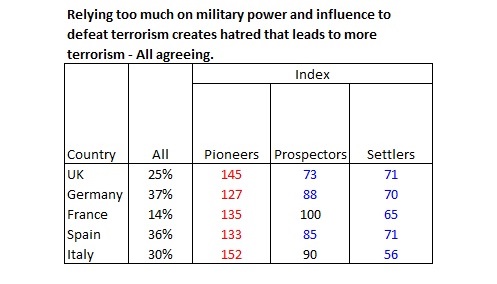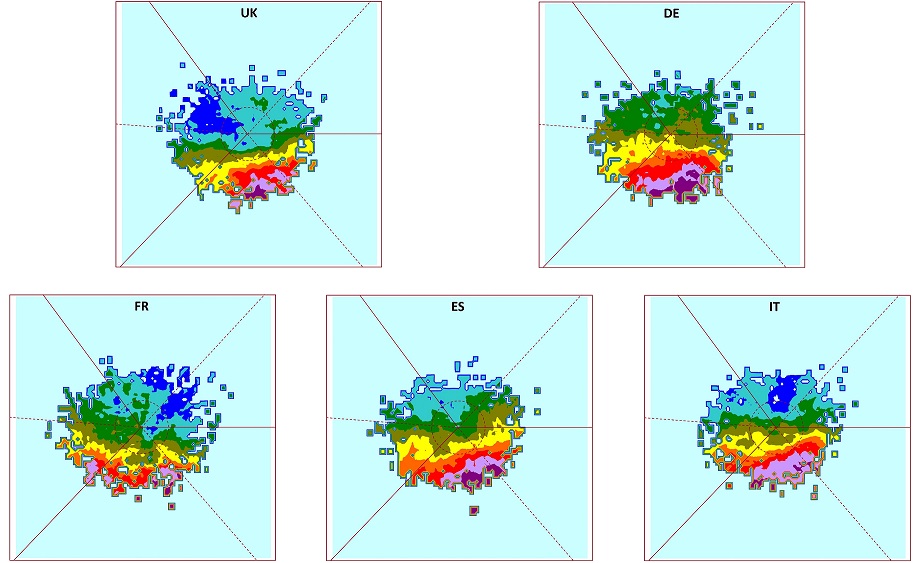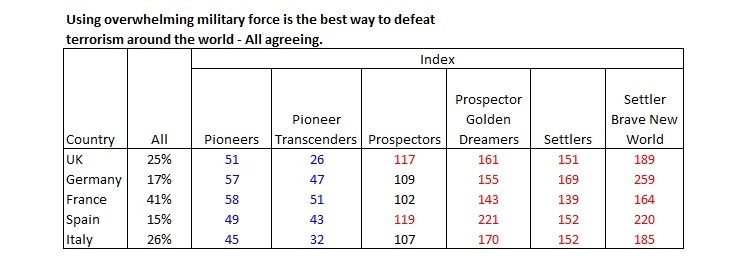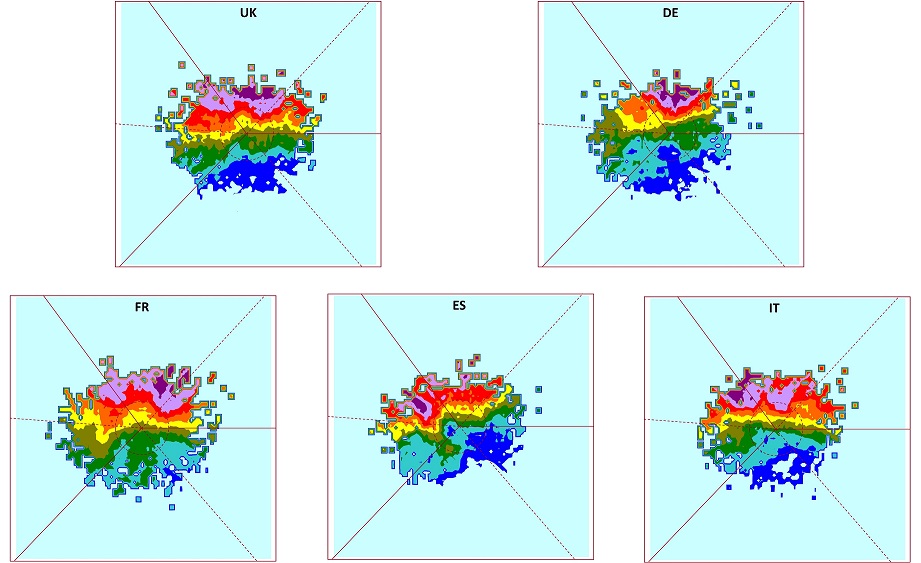

A hard rain is gonna fall (or not) - A European perspective.
To paraphrase William Shakespeare –“To bomb or not to bomb, that is the question.”
Recently, CDSM surveyed 10,000 adults in 5 European countries - the UK, Germany, France, Spain and Italy. The survey took place before and during the November 2015 Paris crisis, and asked the question:

A 6-point slider offered A and B at opposite ends of the scale. The maps and data are based on those who chose the two most extreme slider positions at each end of the scale – that is, option A or one point inside; or option B or one point inside. The central two slider points are only touched on here.
The different countries had different patterns of choice.

The index number show how the Maslow Group differs from ‘all respondents’, e.g. an index of 145 indicates
the score is 45% higher than all respondents – an index of 73 indicates the score is 27% lower than all
respondents (100 minus 27 equals 73).
The UK - the country most involved with long term involvement in recent anti-terrorism wars in Iraq and Afghanistan - was evenly split between those who agreed with either end of the scale, but 50% of the respondents chose to remain non-committed. There doesn’t appear to be a big appetite for simplistic explanations and solutions, let alone knee-jerk responses. Nuanced political thought and actions have strong appeal when it comes to understanding and battling terrorism. It is likely that no one single answer will suit a majority of people. Even if a majority of people espouse one option or another, there is likely to be a sizable minority with the opposite opinion.
Germany - a country that has for the last almost 70 years been at the forefront of European Union and encouraging the inclusion of more member states - produced more respondents that were likely to agree that using “too much military force…creates hatred that leads to more terrorism” than any other country. Only 17% supported military actions. Less people chose the non-committal options than the UK population. Germany can be seen as a moderating influence – especially compared to France.
France was the most committed to using military action. 41% chose the military option and only 14% believed that military force created more hatred and terrorism. As noted above this survey took place before and during the Paris crisis. Indications are that the atrocity that took place in Paris tended to not affect the opinions about the options. The opinions before and after the ISIS claimed actions stayed more or less the same. President Hollande’s response to the actions in Paris have a high congruency with the French public and that is very different from other European nations.
Spain is only slightly lower than Germany (36%) in believing that overwhelming military actions leads to more hatred and further terrorism and only 15% selecting “military force is the best way to fight terrorism”. Although 50% were non-committal, the clear skew was to an openness to more diplomatic efforts rather than a call to bomb.
Italy is more likely to equate military action with continuing hate and further terrorism (30%) –a rate more than the UK but less than Spain or Germany. Fully 26% of respondents also support military force as the best option to fight terrorism. Italy is split fairly similar to the UK.
This is important data for decision makers in democratic governments and among strategic military planners looking at societies facing the threat of non-state violence; and what strengths and weaknesses are inherent in state-sanctioned actions against terrorist activities.
Most media and social commentary will be conducted at this level of information. Though useful, it is not very helpful in understanding the Values War, and the motivations to support one option or the other, within the countries and between the countries. This is where CDSM has a clear advantage over other data providers.
When the responses are analysed in terms of values, a very clear picture emerges that belies the top-line gross percentage differences between countries discussed above.
Values analysis shows consistent patterns of support for the two options and the non-committal positions.
In every country the Pioneers were much more likely to believe that relying too much on military force creates hatred that leads to more terrorism – a clear indication that their thinking was different from narratives calling for military retribution as the best way to fight terrorism.
This response, in the context of the"Values War", is very stark.

Just as stark are the values of the respondents who chose military force as the best option to defeat terrorism.
The analysis shows more granularity than the first option as the supporters are primarily within the transition
zone between Prospectors and Settlers. This is the area that we have previously labelled as the “Intemperate Zone”
or, sometimes, as the “Danger Zone” because of the flux of often conflicting emotions experienced by individuals
caught up in this transition.


Based on this timely evidence it is clear that support for “overwhelming military power and influence” is a dividing issue between values orientations in every society measured in this research.
Though the question was not specific in terms any specific target for military action, or indeed in relation to any specific circumstance, it is very clear that support for the use of military force in terrorist associated situations is likely to be determined by people’s values rather than their nationality.
CDSM will be conducting deeper analysis on this European data against a wide variety of other factors in the coming months – including political party support and political orientation in each country and attitudes to immigrants within countries.
Past experience has shown that Maslow Groups and Values Modes are very likely to be one of the most important differentiating factors in the final outputs.
Interested in knowing more? Contact Pat Dade at mail@cultdyn.co.uk or, for more immediate inquiries, just call 0208 744 2546.
________________________________________________________________________________________________